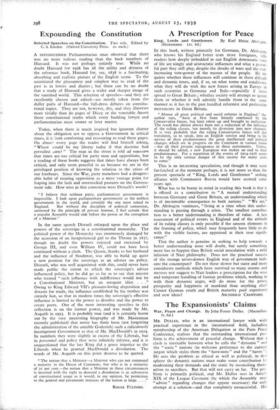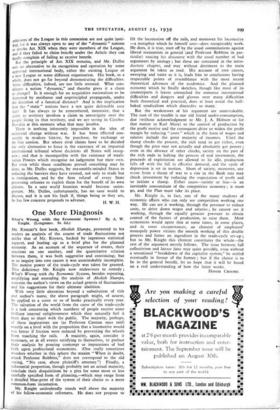The Expansionists' Claims
MR. DULLES, who is an international lawyer with wide practical experience in the international field, including membership of the American Delegation at the Paris Peace Conference, realises that the outstanding international pro- blem is the achievement of peaceful change. Without that a clash is inevitable between what he calls the " dynamic " and the " static " nations (in welcome preference to the current jargon which styles them the " have-nots " and the " haves "). He sees the problem as ethical as well as political; in that sphere the dynamic nations must make some contribution by moderating their demands and the static by reconciling them- selves to sacrifices. But that will not carry us far. The pro- blem is primarily political, and Mr. Dulles sees in Article XIX of the League Covenant (by which the Assembly may " advise " regarding changes that appear necessary) the only attempt at a solution—and that completely unsuccessful. His criticisms of the League in this connexion are not quite justi- fied, for it was always open to any of the "dynamic " nations w invoke Art. XIX when they were members of the League, and if they failed to claim benefit under the Article they can hardly complain of failing to receive benefit. But the principle of Art. XIX remains, and Mr. Dulles sees no alternative to its recognition and operation by some approved international body, either the existing League or a new League or some different organisation. His book, as a whole, does not go far beyond demonstrating the difficulties. Some difficulties, indeed, are too little stressed. What con- stitutes a nation "dynamic," and thereby gives it a claim to change? Is it enough for an acquisitive nationalism to be fomented by assiduous and unprincipled propaganda, under the direction of a fanatical dictator? And is the implication that the "static" nations have a not quite defensible case fair? It has always to be remembered, moreover, that a c:aim to territory involves a claim to sovereignty over the people living in that territory, and we are seeing in Czecho- Slovakia at this moment what that may involve.
There is nothing inherently impossible in the idea of territorial change without war. It has been effected con- stantly in modern history, by purchase, by exchange or by free cession. But where rival claims have to be decided the only alternative to force is the existence of an impartial international tribunal whose decisions all States will recog- nise ; and that is incompatible with the existence of totali- tarian Powers which recognise no judgement but their own. Bat even while those conditions prevail something may be done, as Mr. Dulles suggests, by reasonably-minded States in reducing the barriers they have erected, not only to trade but to immigration, and by the firm refusal of every State possessing colonies to exploit them for the benefit of its ewn citizens. In a sane world frontiers would become unim- portant. Mr. Dulles, unfortunately, has no sane world to discuss, and it is not his fault if, things being as they are, he has few concrete proposals to advance. H. W. H.









































 Previous page
Previous page